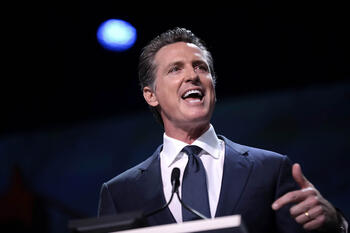California’s Political Landscape: A Reflection on Leadership and Legacy
For nearly fifty years, California has stood as a beacon of innovation, culture, and political evolution in the United States. The Golden State was once synonymous with American success stories, fueled by the talents of leaders like Richard Nixon, Ronald Reagan, and Jerry “Moonbeam” Brown. Each played pivotal roles in shaping a narrative of progression—from Republican resurgences to a progressive backdrop for Democratic presidents like Bill Clinton and Barack Obama. Recently, however, the current Governor Gavin Newsom’s tenure has sparked discussions that diverge significantly from this storied legacy.
The Shifting Golden State
Under the watch of Nixon, Reagan, and Brown, California flourished, radiating a sense of utopic possibility. Fast forward to today, and Newsom is grappling with challenges that stand in stark contrast to his predecessors’ triumphs. Seen as a potential frontrunner for the 2028 presidency, Newsom faces scrutiny not from a vigilant media, but from increasingly disenchanted Californian citizens. Reports of the state’s decline in quality of life, economic stratification, and rising poverty rates paint a different picture than the one his ambitious self-promotion suggests.
The Succession Game
As Newsom’s governorship nears its end, the race for his successor is heating up—yet it appears poised to continue his leftward trajectory. Former Representative Katie Porter, well-aligned with Elizabeth Warren’s brand of progressivism, could seize the opportunity, while Senator Alex Padilla looms as a more moderate contender, although his allegiance to the California establishment raises questions about true reform. The ongoing struggle for the governorship highlights the challenges posed by entrenched party dynamics that stifle meaningful change.
The Declining Republican Influence
Once a robust voice in Californian politics, the Republican Party now finds itself marginalized. With dwindling representation—only nine GOP seats in the House among 52 total—the party faces insurmountable odds. The demographic landscape, shaped by mass migration patterns, has rendered California increasingly hostile to conservative values. Many of those who left were middle-class families seeking better opportunities, leaving an aging population and a middle-class squeeze in their wake.
Meanwhile, state-level Republicans, including sheriff candidates like Chad Bianco and former David Cameron advisor Steve Hilton, struggle to resonate in a climate dominated by progressive ideals. It’s a stark contrast to the days when California birthed modern conservatism, prompting pundits to liken the chances of a Republican resurgence to a “one in every 200 years event.”
The Democratic Stronghold
Despite its present challenges, Democratic dominance remains secure in the state. This stronghold, however, raises questions about accountability. While Newsom touts California’s economic prowess, thanks to tech giants and billionaires, the reality is far less rosy for average citizens. With a notable proportion of the population facing poverty and stagnant job growth, California is no longer the land of opportunity it once seemed.
High housing costs further exacerbate this dilemma, with regulations driving home prices up to levels that put homeownership out of reach for younger generations. The median home cost now towers at nearly 2.5 times the national average, contributing to a historically low homeownership rate. Thus, California’s young and ambitious are increasingly seeking greener pastures in more affordable states, furthering the state’s demographic challenges.
Economic Opportunities and Challenges
Under Newsom’s administration, job creation has faltered. Growth has been largely confined to sectors cushioned by government subsidies, such as healthcare and low-wage service jobs. Prominent industries like tech and aerospace are capitalizing on lower overheads in states like Texas and North Carolina. This outflow of talent and resources paints a grim future for California’s economy, where the promise of well-paying jobs has dissipated.
Despite the prevailing challenges, there are inklings of hope. A potential centrist candidate, LA real estate mogul Rick Caruso, might invoke interest among voters yearning for pragmatic solutions. Yet, he faces challenges in proving his relatability against a backdrop of perceived elitism. Similarly, former LA Mayor Antonio Villaraigosa stands in a precarious middle ground, but would likely struggle against entrenched union and environmental interests.
A Fractured California Dream
Public sentiment indicates a growing discontent with the state’s trajectory. With recent polling showing only a minority of voters believing that California is a model for the nation, it appears that even residents have begun to question the state’s role as a leader. The post-30 demographic expresses particularly bleak prospects, indicating that the once-coveted California Dream is slipping away.
As we reflect on the state’s leadership and its broader implications, it becomes evident that the Golden State’s golden era is in flux. Newsom’s administration represents a pivotal moment, with significant challenges ahead that could redefine California’s identity. Yet, given the current media landscape and the potential candidacies on the horizon, crucial discussions about governance and the future of the state remain cloaked in complexity.
In navigating these turbulent waters, Californians face a critical juncture, with the potential for profound shifts in political alignment and priorities. How Governor Newsom’s legacy is remembered will depend as much on the actions of those who follow as on the choices made in this defining moment.



